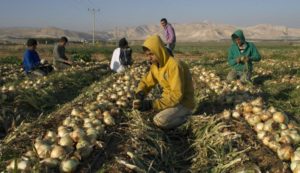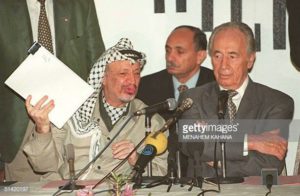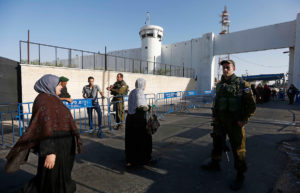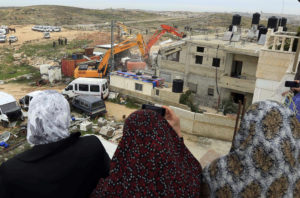Palestinian Prime Minister to Haaretz: ‘The Fact That We Even Survive Is a Miracle’

Mohammad_Shtayyeh
Amira Haas writes in Haaretz, 21 January 2020,”When Palestinian Authority President Mahmoud Abbas presented Mohammad Shtayyeh with his letter of appointment as prime minister in March 2019, he told Shtayyeh, “If I were you, I wouldn’t take the job.” That, with a wry smile, is how Shtayyeh answers when asked why he agreed to accept the most thankless task in the Palestinian political scene.
He had barely settled in at the Prime Minister’s Office, located on Emile Habibi Square in southern Ramallah, when a public opinion poll published by the Palestinian Center for Policy and Survey Research found that most of those surveyed were skeptical that he could improve anything. Another survey this past December by the same think tank yielded almost the same results: 58 percent of the respondents did not believe Shtayyeh’s government would advance toward a reconciliation in the Gaza Strip with Hamas (compared to 33 percent that did think so), and 55 percent thought it wouldn’t be able to improve the Palestinians’ economic situation (vs. 37 percent who thought the opposite).
Shtayyeh’s resume includes political and technical positions. He served twice as the PA’s housing and public works minister; he set up and headed the Palestinian Economic Council for Development and Reconstruction, and filled a number of other economic positions; and he was also involved in various stages of negotiations with Israel – all that in addition to his membership in Fatah. Immediately after assuming the premiership, he rolled up his sleeves and introduced three new terms to the Palestinians’ daily lexicon: disengagement, diversification and clusters. When he explains what he means by them, he sounds determined and enthusiastic; the words just pour out.

Palestinian farmers work in onion field in Jordan Valley
“We’ve adopted a strategy of trying to disengage from our colonial dependence on Israel. To this end we must strengthen the productive capacity of the Palestinian economy, particularly in agriculture and industry. To disengage we have to strengthen our relationships and economic ties with the Arab states. We were in Iraq, Jordan, Egypt; we will travel to Oman, Qatar and Saudi Arabia. Similarly, we will link up more to international markets, we will import directly from abroad and export to those markets. There’s no reason that our economic relationships must be limited to Israel. Diversification is the name of the game; we are diversifying our resources here.”
As part of this diversification effort, he came to an agreement with Iraq to sell fuel to the PA at a reduced price. “Fuel is our biggest expense,” Shtayyeh said. “Every day we buy three million liters a day from Israel, and we pay 650 million shekels [$188.4 million] for it each month. The cheaper fuel from Iraq will reduce the pressure on our budget considerably.”
Four months ago, he added, the PA submitted a formal request to Israel to allow the fuel imported from Iraq (which is refined in Jordan) through the Allenby crossing. It had to submit this request since Israel controls all border crossings. “We wrote that we would finance the infrastructure work at the crossing that would be necessary for streaming [the fuel].” He assumes that there has been no response to the letter, written by the Palestinian National Economy Ministry, because “for eight months there has been no government in Israel.” The agency that was supposed to transfer that request to the Israeli side – that is, to the coordinator of government activities in the territories, or COGAT – was the Palestinian Ministry for Civilian Affairs, headed by Hussein al-Sheikh, who is also a senior Fatah member.
For its part, however, the COGAT spokesman’s office told Haaretz, “We have not yet received an official request from the PA to approve fuel imports to Judea and Samaria, including a detailed plan as is required. When it is received, it will be examined by the relevant authorities in keeping with existing regulations.” The differing versions of what happened with the request typify the Rashomon-esque effect of duplicate bureaucracies that was created by the Oslo Accords.

Chairman Yasser Arafat shows the signed Taba agreement 24 September as Israeli Foriegin Minister
Shimon Peres looks on during the historical Taba agreement to extend Palestinian Autonomy in the West Bank.
From diversification, Shtay
yeh goes on to describe the third component of his strategy: “Strengthening and improving the productive capacity of the economic sectors. What does that mean? You go to Hebron and hear people say, ‘No one is giving us anything.’ You hear the same story in Gaza and other cities in the West Bank. Why are they complaining? Because the process of development isn’t connected to geography but to issues. We said that we would create a socioeconomic development paradigm that’s built on clusters”.
Shtayyeh and his team divided up the West Bank and the Gaza Strip according to the unique economical advantage of every region “and this is in order to create a competitive advantage” of each one of them, as he explained. In each region there would be “horizontal,” similar development of infrastructure (roads, electricity, water and schools), and “vertical” development, which addresses the main economical characteristic of each cluster. The governorates of Qalqilyah, Tul Karm, Jenin, Tubas and Jericho (also meaning the Jordan Valley) are the agricultural clusters. Nablus and Hebron – the industrial. Bethlehem’s uniqueness is its touristic potential. Jericho offers entertainment as well as agriculture. Ramallah is the city of public administration and finance. Gaza was divided into three clusters: marine, industrial and agricultural. Jerusalem’s governorate is also included in Shtayyeh’s plan, a promise that the Palestinian residents of the city view with skepticism.

Changes have also been instituted lately in loan policy: For years Palestinian banks in the West Bank (whose total capital doubled from $7.6 billion in 2008 to $16 billion today) offered loans primarily to large trade companies and individual consumers. Now, encouraged by Shtayyeh’s government, the trend is to lend more to investors in productive sectors in order to support development according to the clusters strategy.
“If an investor comes and wants to build a factory in Bethlehem, for example, we’ll tell him ‘no’ – we won’t give him benefits or incentives to build there. [We would say] build a factory in Nablus or Hebron,” he explained. There are now three factories being built in Hebron to produce fodder.
A large tract of land was allocated in Jenin 15 years ago to create an industrial zone (arousing the anger of social-justice organizations because it was at the expense of farmland). It stood empty all those years, and although Jenin is designated now as an agricultural cluster, infrastructure work has begun only recently there. Shtayyeh said that a facility to produce solar energy would be built at an investment of $100 million in Jenin. His administration is giving special emphasis to creating jobs for young people and opening professional training courses for them.
In September a ceremony was held to declare Qalqilyah the first agricultural cluster. The plan is to invest some $23 million in that area alone within three years. The PA has committed to rehabilitate and prepare another 8,500 dunams (2,125 acres) for agricultural uses, pave new farmland roads and create labs for agricultural research and development. The government has also promised 180,000 new fruit saplings will be planted in the Qalqilyah area, which will increase Palestinian agricultural output by 7 percent and create 3,200 new jobs. Last week, Shtayyeh attended a cornerstone-laying ceremony for four new hotels in Bethlehem.

Palestinians make their way through an Israeli checkpoint along Israel’s controversial separation barrier to attend the last Friday prayer of the holy fasting month of Ramadan in Jerusalem’s Al-Aqsa mosque, in Bethlehem in the occupied West Bank, on June 8, 2018.
‘Not in his hands’
Before interviewing Shtayyeh, 62, I asked several Palestinian friends and acquaintances to suggest some questions. The typical response to my request was, “We have nothing to ask because we know it’s not in his hands.” I got the same answer from people who have confidence in Shtayyeh’s good intentions and from those who don’t. When they say “it’s not in his hands,” they mean that there are two other entities that do decide: The Israeli government and, to a different extent, Abbas.
Shtayyeh, if he had heard those people, would have vehemently objected. In general, he doesn’t give the impression that he’s upset by the unfavorable attitude toward him and his government and the almost-Pavlovian assumption that it will fail.
“You should read ‘Factfulness,’” he said, with a didactic tone that creeps into his speech from time to time – which shouldn’t surprise anyone: He was formerly a professor of economic development at Birzeit University, outside Ramallah, where he also earned a B.A. in economics and business management. He completed his master’s degree and PhD at the University of Sussex in Britain; his doctorate in economic development was on the transition of the Palestinian farming economy in the West Bank and social relationships under Israeli occupation.
“Factfulness,” by Hans Rosling, he continued, “Starts with one question, which was posed to people in various countries: Are you satisfied with the services your government provides? In every place the answer was ‘no.’”
If we had had more than an hour and a quarter for our conversation, I would have asked him whether the comparison to sovereign countries isn’t a way of normalizing the peculiar, abnormal situation in which the PA is responsible for solving problems caused by Israeli domination and its policy of settlement expansion. But Shtayyeh essentially answered the unasked question when he said, “Look, my dear, we are under occupation. That means that Israel can put up checkpoints, arrest me, kill me or expel me. What I’m saying is that we have our own ways of confronting the reality that’s been imposed on us.”
He describes the reality that greeted him when he assumed his position as informed by the “four wars” Israel conducts against the Palestinians simultaneously: the geographic war, of shrinking Palestinian territory on behalf of expanding settlements; the demographic war of both “soft” and “hard” force, as he put it, for Palestinians in Jerusalem and in Area C to leave; the financial war, involving confiscation of Palestinian funds on various pretexts; and the war over the narrative.
“For example, by its invasion of Al-Aqsa, of Joseph’s Tomb and of the Al-Ibrahimi Mosque [the Tomb of the Patriarchs], Israel is trying to impose its narrative on our history,” Shtayyeh said, adding that the four wars he mentioned are also expressed in unemployment and poverty, and the isolation of Gaza.
To this, he observed, one must also add the sharp decrease in funding from donor countries, the cessation of U.S. aid to the PA and to the United Nations Relief and Works Agency for Palestine Refugees, and the diplomatic blows the United States delivered to the Palestinians by moving its embassy to West Jerusalem and by shuttering the PLO’s embassy in Washington.

house being demolished in Beit Hanina
Shtayyeh: “We know that at the macro level, everything is blocked. There’s a serious political dead end. The status quo isn’t static; it’s a deteriorating status quo. In Palestine there’s no such thing as ‘business as usual.’ For us nothing is ever usual. With all the blows and the wars Israel conducts against us, the fact that we even survive is a miracle.”
In his confident and decisive voice, the prime minister explained that he agreed to be appointed to his post because “It’s my duty to serve the nation,” and because he believed he could bring added value to it, “and aim things in a better direction.” The confidence expressed by Abbas when he told him, “You will do good work in these difficult times,” and the support of Fatah’s revolutionary council and central committee, of which Shtayyeh has been a member since 2009, give him a tailwind.
How do you define the job of the Palestinian government, I asked – and was once again surprised by how his answer would be suitable to that of a government in a sovereign state.
“The Palestinian government is an integral part of the Palestinian arena, next to the PLO and the presidency, the civil society and the private sector. It can’t be isolated from the political framework. It’s also an integral part of the Palestinian cause. But the party that is in direct contact with the people is the government, not the PLO. We are the provider of services that have to do with the daily life of people.” But the government, Shtayyeh said, is also a natural part of the overall political context, and without understanding it “the prime minister will be lost.”
When I asked about the corruption in the PA and the public’s impression that it has spread to all of the authority’s institutions, he said, “There’s corruption all over the world; what’s important is that there are mechanisms to expose and fight it, and that its scope is smaller than what people think.” What about the disputes between members of Fatah? “Disagreements are healthy,” he replied.
I asked about the frequent mutual insults among Fatah’s high ranks that fatigue and repel people – most recently, Jibril Rajoub, secretary general of Fatah’s Central Committee, called PA intelligence chief Majed Faraj a collaborator and Hussein al-Sheikh, the civilian affairs minister, a harasser of women. Shtayyeh dismissed the question with a wave of his hand and said, “Leave it.”
The Palestinians are skeptical about the disengagement’s chances and its scope. Some interpret Shtayyeh’s economic moves negatively. They ask, for example, whether there really should be new hotels in Bethlehem, where everyone suffers from the regular shortage of drinking water. The decision to stop importing calves from Israel is being interpreted by some as supporting major Palestinian importers who can afford to underwrite large shipments from Portugal or Australia – and are also close to Fatah – at the expense of small businessmen who could only import from Israel.
“It’s not a matter of large or small merchants, but of diversification and reducing our dependence on Israel,” Shtayyeh declared, stressing that the Israeli-Palestinian economic agreement doesn’t forbid imports from other sources. “We import 5,611 different items from Israel. Some of them have no alternative, but there are things that we can produce ourselves and the rest – import ourselves, from elsewhere.”
Treatment and taxes
A nongovernmental organization examined the promises made by his government and found that only a small proportion have been fulfilled thus far. “It’s ridiculous to expect us to promise hospitals and then build them within eight months,” Shtayyeh said dismissively, noting that although all the forecasts by international economic agencies had predicted the Palestinian economy would contract 2.7 percent by the end of 2019, the economy actually grew 1.9 percent. He attributed that to reduction of expenses, improved tax collection and efforts to block fuel smuggling from Israel. Next month he will submit his full plan for the economy to the public and President Abbas, he said, adding: “In spite of the further stealing of our tax money, decided by [Israeli Defense Minister] Naftali Bennett, we continue in our plan. If we want a Palestinian state, this is the right direction, the only approach.”
The prime minister is particularly pleased with the decision to stop referring Palestinian patients to Israeli hospitals when Palestinian hospitals cannot provide suitable treatment, and to send them to Egypt or Jordan instead. On that point, I had to challenge him. “Here you didn’t take into account patients from Gaza,” I said. “It’s harder for a cancer patient from Gaza to drag himself to Cairo or Amman than for a patient from Ramallah to go to Amman. In addition to the risks en route to Cairo, people are convinced that the treatment there is inferior.”
It was the only time during the interview that Shtayyeh sounded upset or even angry. Clearly, the allegation that the PA is abandoning the sick of Gaza aggravated him.
“We offer full medical services to Gaza residents, even though nobody there pays for health insurance. When there was a shortage of drugs, the shortage wasn’t just there. We will continue to provide treatment – just not in Israel. We discovered, for example, a case of a woman and her sick son who had spent 449 days in an Israeli hospital. Why? What medical need was there for that? We paid the hospital for them around 2,500 shekels for each day. We were paying Israeli hospitals 40 million shekels a month, which we were charged without proper oversight or details about what we were paying for and why.
“We are hemorrhaging financially,” said Shtayyeh, recalling the World Bank report from January 2014, which estimated that without Israeli restrictions on Area C, PA revenues would be $4.3 billion higher annually. A UN report published in December estimated that between 2000 and 2017 the Palestinian economy had lost nearly $48 billion because of Israeli limitations, high fees it charges and tax leakages.
Like former Palestinian Prime Minister Salam Fayyad, who in 2009 said the letter C did not exist in his alphabet, Shtayyeh said he doesn’t distinguish between A, B and C in the development he’s planning for each cluster, and that the PA is seeking to end these artificial demarcations. “Not because we wanted to do it,” he stressed, “but because Israel decided to do it. The demolition of the neighborhood in Wadi al-Hummus [part of Jerusalem’s Sur Baher neighborhood] was the straw that broke the camel’s back.”
“The framework of our relationship with Israel is the Oslo Accords, but Israel is the one violating them,” said Shtayyeh. “If for [Israel] the whole West Bank is C, then for me the whole West Bank is A.” [Under the accords, Area A includes all large Palestinian cities and is under civilian and policing responsibility of the PA; Area B is under civilian responsibility of the PA and Israeli security control; and Area C, which covers 62 percent of the West Bank is under full Israeli civil and security control. Also according to the agreement, this artificial zoning should have ended by 1999.
On the other hand, added Shtayyeh, “There’s nothing in the agreements that forbids us to develop in C” – but he wasn’t very persuasive. I reminded him of Israel’s policy of forbidding the villages on the outskirts of Yatta (among many other communities) to connect to the water infrastructure. In an act of civil disobedience, the local council laid several pipes between it and neighboring villages last year, but Israel’s Civil Administration destroyed them within months.
Even though the PA hadn’t financed those simple pipelines, I asked Shtayyeh, “In the end, how is it financially worthwhile to build or develop in an area that’s all A to you, but which Israel will immediately demolish?”
He replied: “The issue is not one of economics but of our political will. If we only make calculations of economic feasibility and financial losses, we won’t do anything. For our part there’s the political will to preserve the entirety of the Palestinian territory. That’s the most important thing.”
He again referred to the Oslo Accords, which, according to him, allow Palestinians “to cultivate every dunam of land in Area C. When the Israelis destroy an orchard, they are violating the agreements. No one can stop us from working the fields or upgrading the water infrastructure. How successful we will be with what we do is another story.” This article is printed in its entirety.
